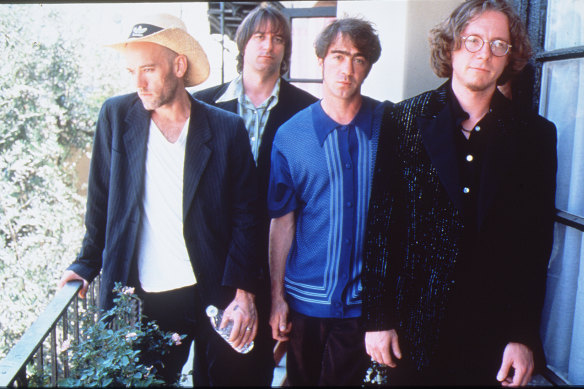

Credit:
BIOGRAPHY
The Name of This Band is R.E.M
Peter Ames Carlin
Harper Collins, $36.99
If you could take a time machine to any moment in the history of alternative music, there would be few better destinations than Kathleen O’Brien’s birthday party, in a church in Athens, Georgia, 1980, where R.E.M played their legendary first gig.
Biographer Peter Ames Carlin – who has previously written thoughtful tomes on Bruce Springsteen and Paul Simon – takes you there. Every detail is vividly captured – Peter Buck’s nervous pre-show beer chugging, the high and excited art-school students perched on the rafters watching through the windows, the telling choice of cover songs (The Velvet Underground, The Monkees), and, most of all, the sense that this still-unnamed local quartet was producing something new and magical.
This was music that asked you to lean in. Their original compositions had gnomic, often indecipherable lyrics, inviting listeners to fill in the blanks. Yet, there was an emotional directness to the songs from the start, what Carlin calls “the blur between obscurity and tenderness” that made their music a siren song for anyone who felt like an outsider in Reagan’s America.
Like every successful band, they were greater than the sum of their individual parts. In Michael Stipe, they had a frontman both mysterious and magnetic. Bill Berry and Mike Mills were dedicated, distinctive players. Former record store clerk Peter Buck, their lead guitarist, had studied classic riffs with a scholar’s zeal. Influenced by both the queer art scene Stipe gravitated towards and their Southern upbringings, they learnt the rules of pop music so they could break them.
Their 1983 full-length debut, Murmur, still astonishing in its freshness, would become an inflection point for the band’s followers. For some (Carlin calls them “Murmurers”), it’s still the purest distillation of their influences – ranging from Patti Smith’s jarring poetry to Big Star’s jangling guitars – ever committed to tape. For others, it’s an arty outlier before their bigger, cleaner-sounding records such as Out of Time and Automatic for the People sold tens of millions and packed stadia worldwide.

From left, R.E.M band members Michael Stipe, Peter Buck, Bill Berry and Mike Mills pictured in 1996.
The tension between these two schools of thought provides the central through line of The Name of This Band is R.E.M. It’s a tale dense with detail – seemingly no gig, recording session or interview goes unmentioned, yet the narrative weaves in enough cultural context and character insights to maintain a propulsive momentum.
From their early days, R.E.M were characterised by a rare integrity and a palpable sense of purpose. They played endless shows, slept on floors, survived on little food, did every interview at every tiny radio station. No band that didn’t want fame would work this conscientiously, but they were determined to bend the mainstream to their will.



